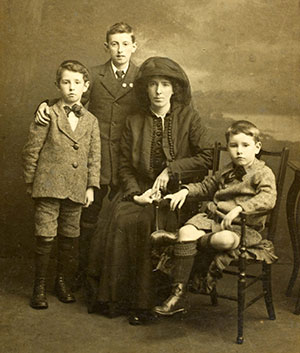100 YEARS AGO: Irish National Aid and Volunteers’ Dependants’ Fund
Published in Issue 2 (March/April 2017), Volume 25By Joseph E.A. Connell Jr

Above: Kathleen Clarke, in widow’s weeds, with her children after the 1916 Rising. The amalgamation of her Irish Volunteers’ Dependants’ Fund with the less radical Irish National Aid Association occurred on her terms.
Thomas Clarke had given his wife, Kathleen, access to the IRB’s funds (amounting to £3,000) to be used for the aid and relief of those involved in the Rising. Gerry Golden remembered:
‘On 17th June [1916] Mrs Clarke suggested that a fund should be opened to help the dependants of Volunteers and that the fund should be known as the Volunteers’ Dependants’ Fund. It was opened by a subscription from Mrs Clarke of either £20 or £25, and from my own family and my own relatives and friends in Dublin who helped me I obtained about £15.’
Paddy Holohan obtained something like £30 from the area that he had visited:
‘As there were two funds being collected for the Volunteers’ dependants, one formed by Mrs Clarke known as the Volunteers’ Dependants’ Fund, and the other known as the National Aid Fund, there was a conference called by the committees of both funds and it was decided to amalgamate the two funds, but no definite decision was then arrived at.
At that conference I met Greg Murphy who was then Leinster treasurer of the IRB, and in the course of conversation he told me that he would try and get some others of the officials of the IRB to have it re-organised, but I do not remember anything further about the organization until some months afterwards.’
Clarke did not initially consider this proposed merger a sensible one. She had come to see the IVDF as a sacred torch passed to her by her dead husband. She saw it as republican property and would not allow it to merge with a fund that was partly administered by non-republican parliamentarians. She therefore insisted that a number of personnel whom she considered parliamentarian be removed from the INAA before she would merge her organisation with it. The National Aid fund may have been running a little low, however, as Nancy Wyse-Power later alleged that it was when the National Aid funds ran out that the merger of the two organisations occurred. Thus when the Irish-American group Clan na Gael sent two delegates to Ireland with a substantial sum of money and a merger proposal, the financial position of the National Aid fund might have been what forced them into negotiations with Clarke’s Volunteers’ Dependants’ Fund. In September, after the negotiations, the inspector general of the RIC reported the merger of the two groups as follows:
‘The Irish National Aid Association and the Irish Volunteer Dependants’ Fund were amalgamated during the month at the instigation of two American delegates—A. Murphy and J. Gill—who brought over a contribution of £5,000 collected under the patronage of Cardinal Farley of New York. The amalgamated fund now amounts to £28,000 … Therefore it may be assumed that it is under Sinn Féin control.’
Whatever the financial situation of the National Aid fund, it is clear from her account and that of the inspector general that the merger occurred on Clarke’s terms. The new organisation was called the Irish National Aid and Volunteers’ Dependants’ Fund and was managed by women: Kathleen Clarke (president), Áine Ceannt (vice-president), Máire Nic Shiubhlaigh (treasurer), E. MacRaghaill (secretary), Margaret Pearse, Muriel MacDonagh, Eily O’Hanrahan, Madge Daly and Lila Colbert. Later Clarke employed Michael Collins, who used his position to contact and direct activities of the members of the IRB.
Joseph E.A. Connell Jr is the author of Michael Collins’s Dublin (Wordwell Books).
















